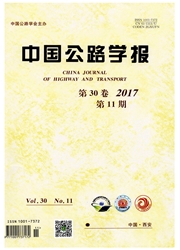

 中文摘要:
中文摘要:
以提升中心城区高校停车场泊位利用效率为目标,建立高校共享泊位决策——停车者泊位分配的双层模型,上层模型综合考虑高校停车供需特性和预留泊位要求,提出高校停车泊位共享方案的4类判断准则,下层模型进行停车泊位需求时变状态预测,提出改进的SEM-Logit停车行为选择模型进行实际停放过程的模拟,并提出共享泊位动态分配具体流程。定义泊位共享效率、停车失败率和泊位占用率3个指标进行共享效果评价。选择南京市南京医科大学和周边居住区停车场为实例,对模型进行验证。研究结果表明:高校停车共享时段宜设置在7:00~8:00,10:00~12:00以及16:00之后3个时段,居住区共享时段集中在7:00~10:00和午后12:00~15:00;高校在夜间向居住区开放泊位,居住区在上午和下午向高校开放的效率更高;共享泊位后,高校和居住区过饱和停车现象显著降低,泊位利用率有所提升。
 英文摘要:
英文摘要:
For the purpose of improving the campus parking berth's utilization efficiency in central city,campus shared-use parking decision was built,which was a two-layer model of berth allocation.The upper model proposed four types of judgment criteria on shared-use parking rules considering the parking supply and demand characteristics and reserved berth requirements.The lower model predicted parking demand time-varying state,proposed the improved SEM-Logit parking choice behavior model to simulate the actual process of car park and proposed shared-use berths dynamic allocation process.Three parameters were defined to evaluate the sharing effects,including shared berth utilization efficiency,illegal parking ratio and berth occupancy ratio.Nanjing Medical University with the surrounding residential parking lots was taken as an example to validate the model.The results show that the campus parking sharing time session should be set during 7:00-8:00,10:00-12:00and after 16:00,while the residential affiliated parking lots focus on 7:00-10:00and 12:00-15:00.Campus should open the parking berth to residential areaat night,while residential area should open in morning and in afternoon.After setting shared-use parking,oversaturated parking at campus and residential area reduces significantly and berth utilization efficiency improves.
 同期刊论文项目
同期刊论文项目
 同项目期刊论文
同项目期刊论文
 期刊信息
期刊信息
